History
The Stine name has a proud history dating to the 1940s when Bill Stine began cleaning public variety soybean seed with a portable cleaner. Since then, Stine has grown and expanded, becoming one of the most recognized and respected names in the corn and soybean industry.

Late 1800s
William and Sarah Stine (with oldest child Ira Cloyd) arrive in Adel, Iowa, from Pennsylvania. The original farm was 160 acres with only 30 tillable acres at the time. Ira Cloyd marries Lydia Sheaffer. The couple will have 4 children — all boys — including Harry‘s father, Bill (William). All four boys farm together as I.C. Stine and Sons until shortly after World War Two.
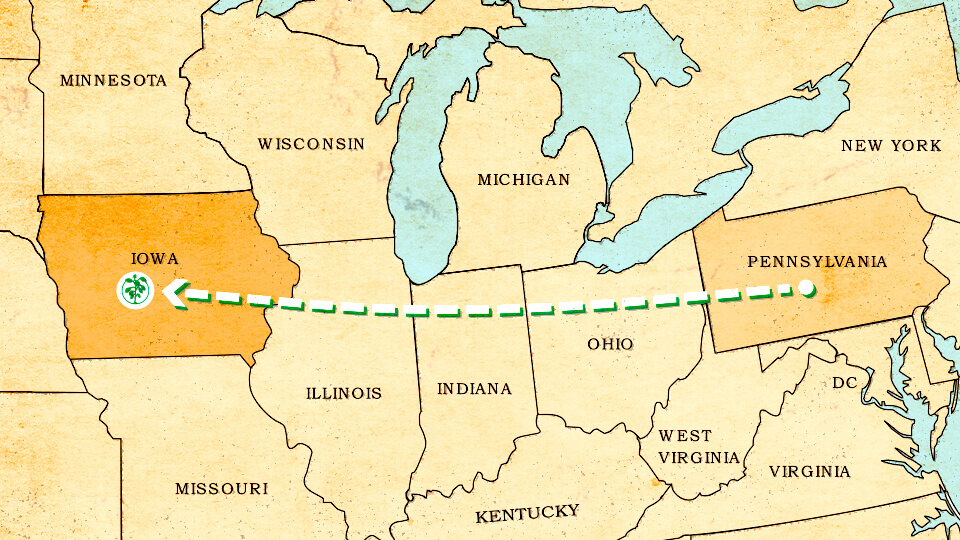

1930s
Bill and Roselba Stine move to the location where Stine Seed Farm would eventually be located. Extreme droughts in 1934 and 1936 make for a rough start.


1950s
Bill Stine founds Stine Seed Farm, cleaning certified oats and public variety soybean seeds with a portable cleaner. Bill wins the Dallas County Soybean Yield Contest in 1955 and 1957.
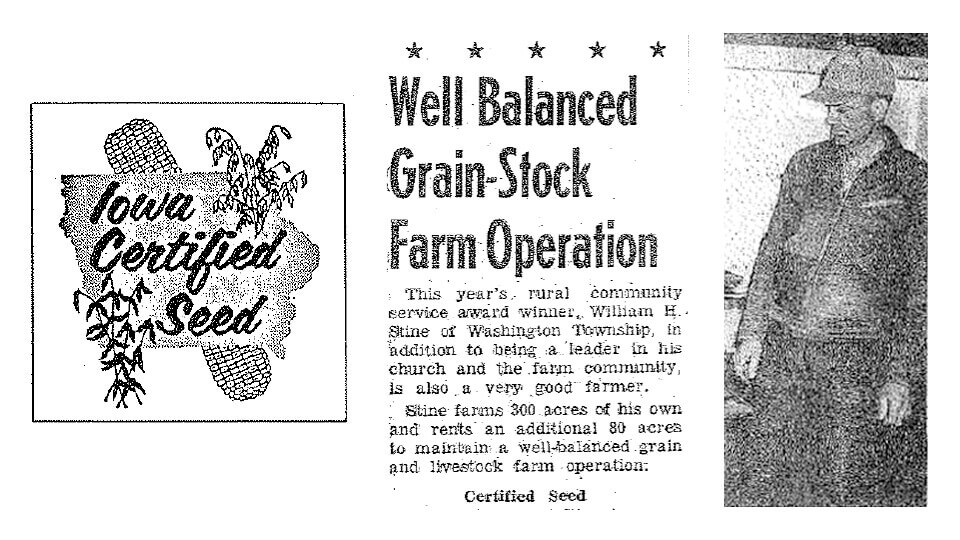

1964 – 1966
Harry Stine, President of Stine Seed Farm, joins his father, Bill, in the soybean cleaning venture.
Harry becomes interested in soybean breeding after finding some unusual soybean plants in a farm field, and goes on to found Stine Seed Farms. Harry loved to farm, but also recognized additional profit opportunities by developing newer, higher-yielding soybean lines. He began breeding and “yield checking” soybean lines (previously only done by universities), and he came to understand (while actually weighing varieties himself ) what a conventional breeding program could bring to the soybean industry.
Stine Seed Farm builds a modern soybean seed production facility.
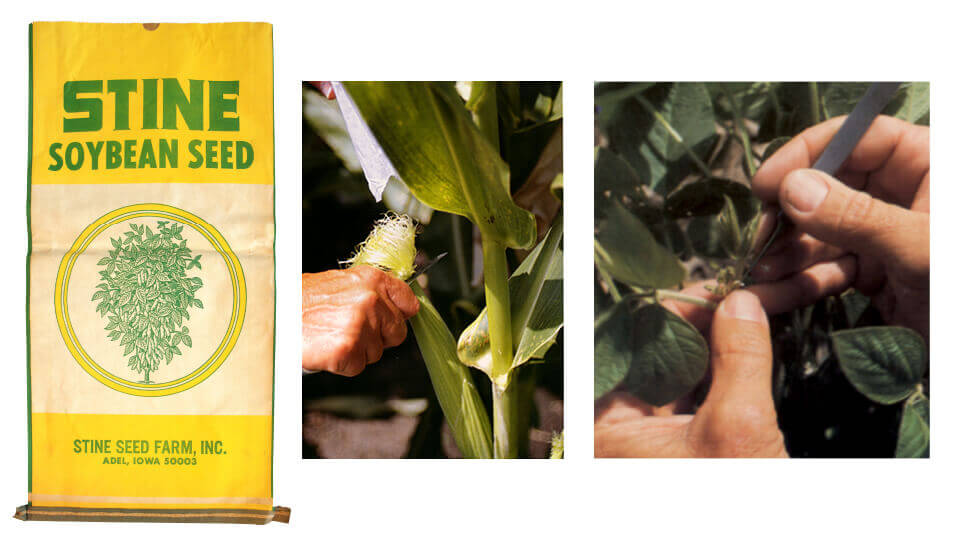

1967 – 1968
Harry and Bill Eby begin soybean breeding. ISU professor Walter Fehr is an early partner in the breeding work.
Harry Stine, along with four other investors, founds Improved Variety Research (IVR), a soybean breeding organization. It is the first private soybean research and development firm in the U.S.
Work for IVR is conducted at Stine Seed Farm and directed by Harry Stine and Bill Eby, the head plant breeder.
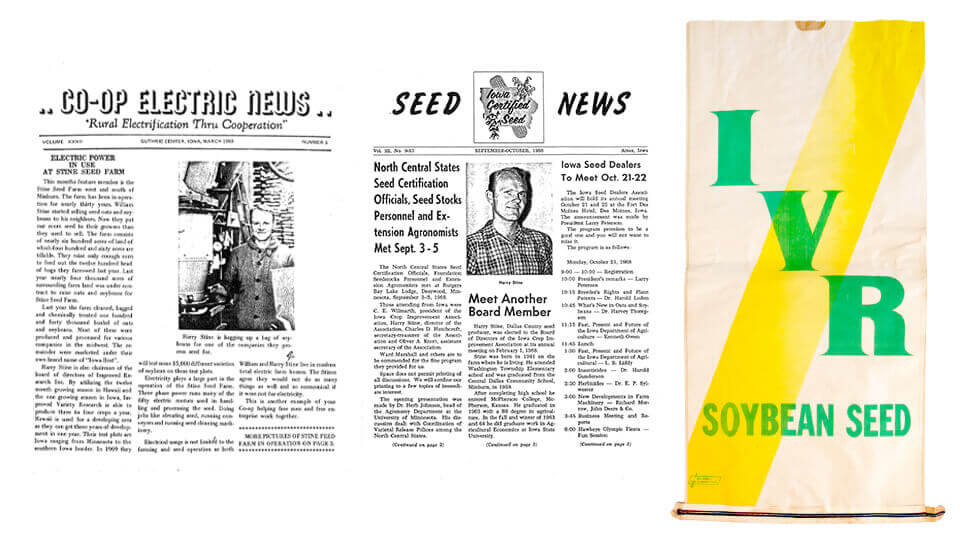

1973 – 1975
IVR is dissolved. Harry Stine and Bill Eby form Midwest Oilseeds, which will go on to become the largest and most successful soybean research and development program in existence. In just a few short years, Midwest Oilseeds is the soybean genetics licensing company of choice in the United States.
Stine Seed Company begins a program to breed and develop high-yielding hybrid seed corn.
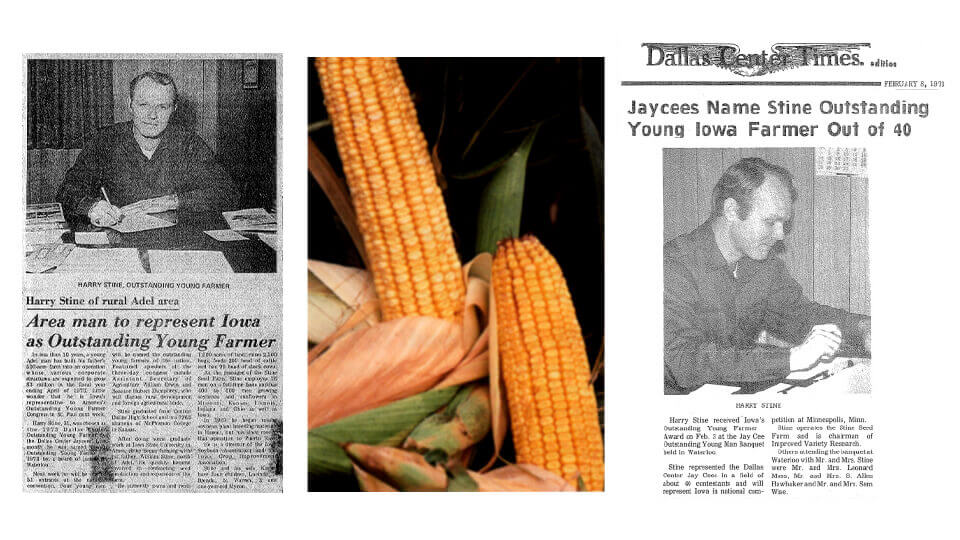

1979
Retail soybean seed sales efforts began in 1979, with soybean seeds selling under the Stine Soybean Seeds label. “Home of the New Varieties” is born with Paul Bissinger heading the retail division as the first salesperson for Stine Seed Company.
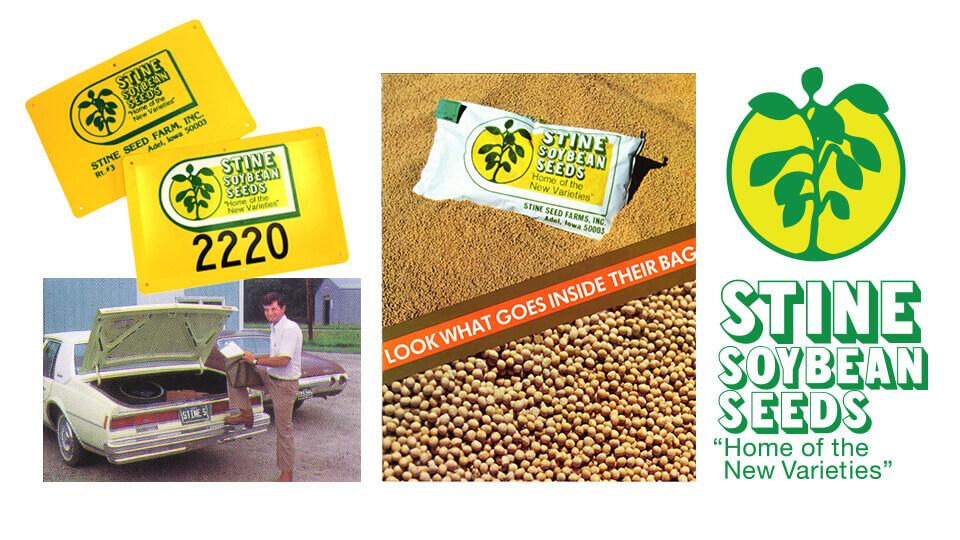

1980 – 1984
Harry and Bill Eby create Eden Enterprises to function as Stine’s corn breeding company. Stine 2050 tops ISU yield trials out of 344 entries.
In five short years, Stine Seed Company achieves sales in excess of a half million units. Stine Seed Company’s marketing organization for soybean extends from Ohio to Colorado, north into Minnesota and south into Missouri.
Stine expands soybean research to locations east of Mississippi.
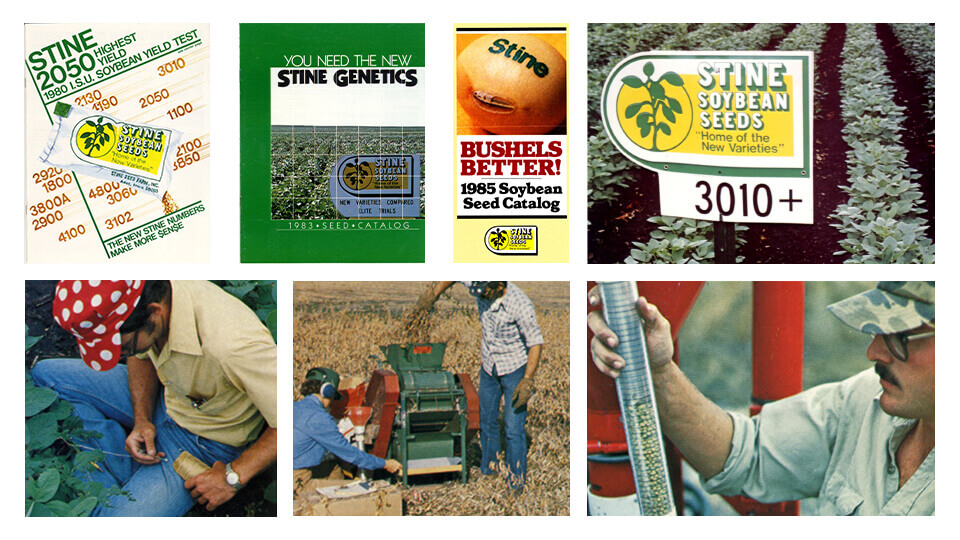

1986 – 1989
Construction of Stine’s new headquarters is completed.
Stine Seed Company acquires nine regional seed companies, expanding the company’s marketing area from Nebraska to Ohio, Dakotas to the boot heel of Missouri. In addition, this brings new offerings— such as corn, oats and soft red winter wheat—to dealers.
Harry Stine honored as Agrimarketer of the Year by the Iowa Chapter of the National Agri-Marketing Association and Iowa/Nebraska Entrepreneur of the Year by Ernst & Young
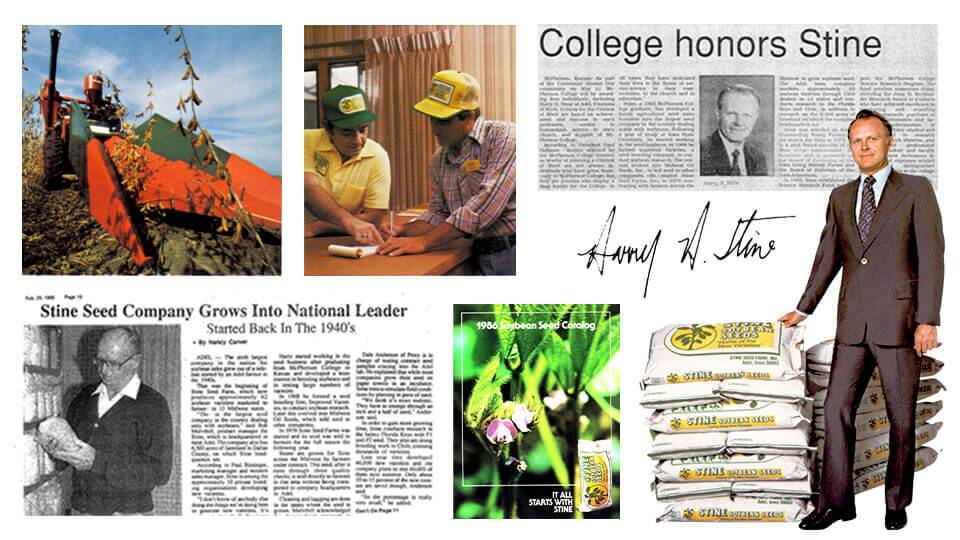

1990 – 1992
Stine’s dealer force grows to 1,700 dealers in 15 states, marketing in excess of 1 million units of soybean seed.
Stine Seed Company is the largest domestic, privately owned seed company in the United States. Stine‘s retail program is the 4th largest marketer of soybeans in the United States. At this point, 150,000 soybean lines are tested each year. Soybeans developed by Midwest Oilseeds are sold through 160 different brand names. Stine 2250 Brand soybeans are introduced. These genetics, along with associated sister lines, were unmatched in the 2.5 maturity and cemented Stine‘s status as the soybean yield leader. Stine 2250 would go on to become the most widely planted group II soybean genetics ever.
Stine Seed Company is one of the top four companies in the United States selling soybean seed. Stine begins selling corn, and soft red winter wheat in 1992.
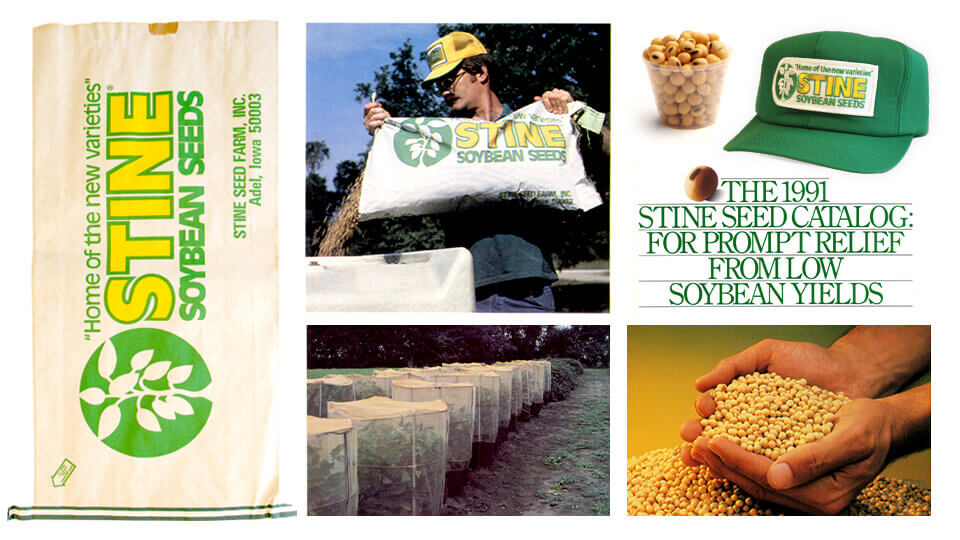

1994 – 1995
Stine Seed Company becomes the first company in United States history to receive a patent on soybean varieties. Patents are granted on two soybeans: Stine 1570, patent #5304728 and Stine 2550, patent #5304729. These patents protect the seed, plant, pollen and ovule. These patents are a main part of Stine‘s emphasis on breeding and developing the highest yielding soybean genetics in the world.
Stine Biotechnology opens in Ames, Iowa. Its main focus is to develop a proprietary method for inserting genes into plants.
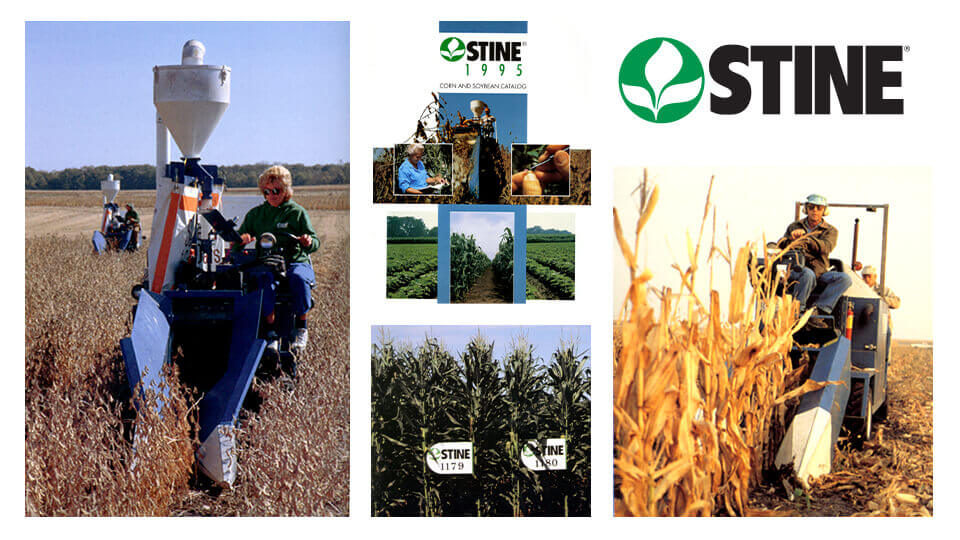

1997 – 1999
Stine Seed Company enters into a non-exclusive agreement with Monsanto Agricultural Products and Asgrow Seed Company. The agreement is designed to further improve and develop soybean genetics and product-development technologies. As a result of the agreement, farmers will have access to the best seed products available in a wider choice of brands, since these technologies will end up not only in Stine branded products but also in seedstock developed by Stine, which is licensed to other companies.
Adding to its offerings on the service side, Stine Seed Company begins its agronomy services program. Stine agronomists’ duties include troubleshooting farmer issues, hosting educational meetings for growers and disseminating information regarding Stine Seed Company products.
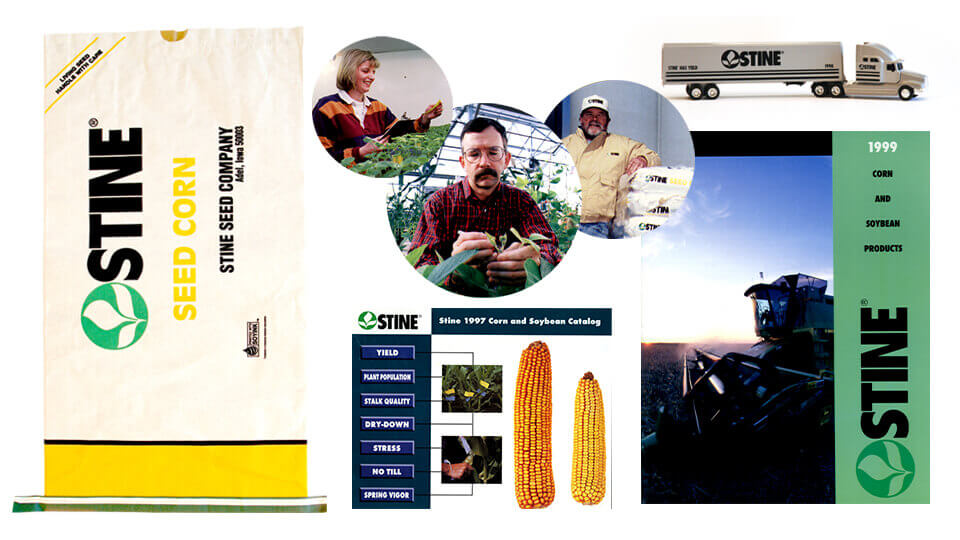

2000 – 2007
Harry Stine named one of Iowa’s 50 Most Influential People by the Des Moines Register. In 2002 Harry receives an honorary doctorate degree from McPherson College. The next year he is inducted into the Iowa Business Hall of Fame.
In 2003, Stine Biotechnology debuts the Aerosol Beam Injector, a new, patented technology for genetic transference for the seed industry. With the new Stine Aerosol Beam Injector system, Stine is able to continue its industry-leading tradition of bringing the best genetics to American farmers.
Harry Stine recognized by the Iowa Biotechnology Association with the Entrepreneurial Achievement Award. Iowa Farm Bureau honors Harry Stine with its Distinguished Service to Agriculture Award.
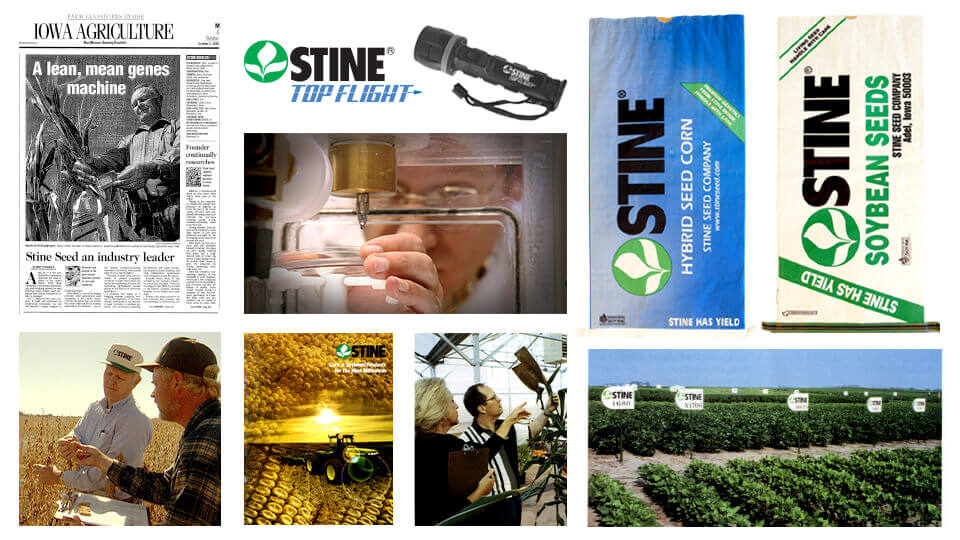

2008
Stine partners with Clement Racing to sponsor a car in the ARCA RE/MAX racing series. Driver Matt Carter finishes third in driver points overall and is named SunTrust Rookie of the Year.


2009
Stine celebrates 30 years in the retail seed business and has 20 agronomists on staff.
Stine begins marketing LibertyLink® soybeans. With more LibertyLink soybeans, and a wider range of maturities than any other company, Stine plays a major role in the commercial launch of this new soybean technology.
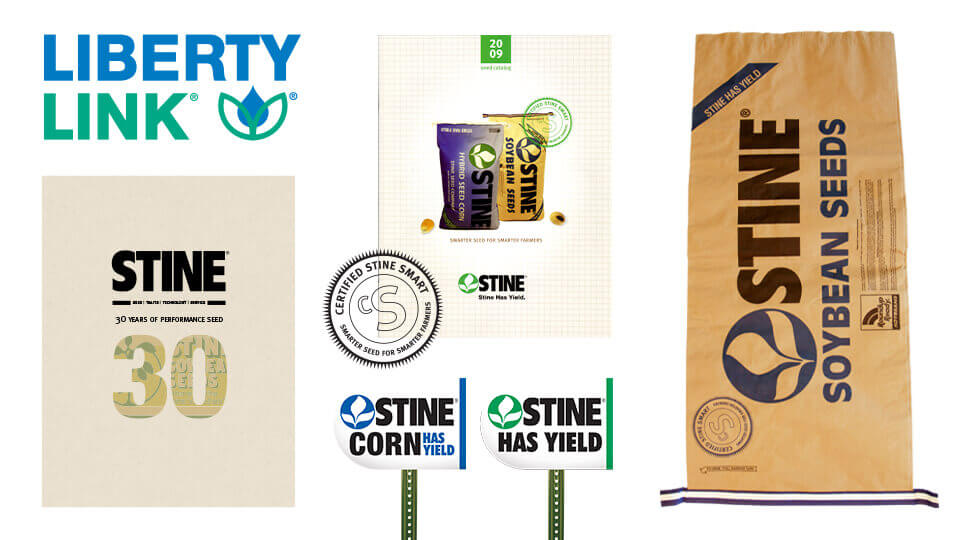

2011
Seeing the future of corn production, Stine converts all of its corn research to 20-inch rows. Going forward, this change will lead to hybrids that are better suited to narrow rows and higher populations. At the same time, Stine’s on-farm production moves to ultra-narrow 12-inch rows.
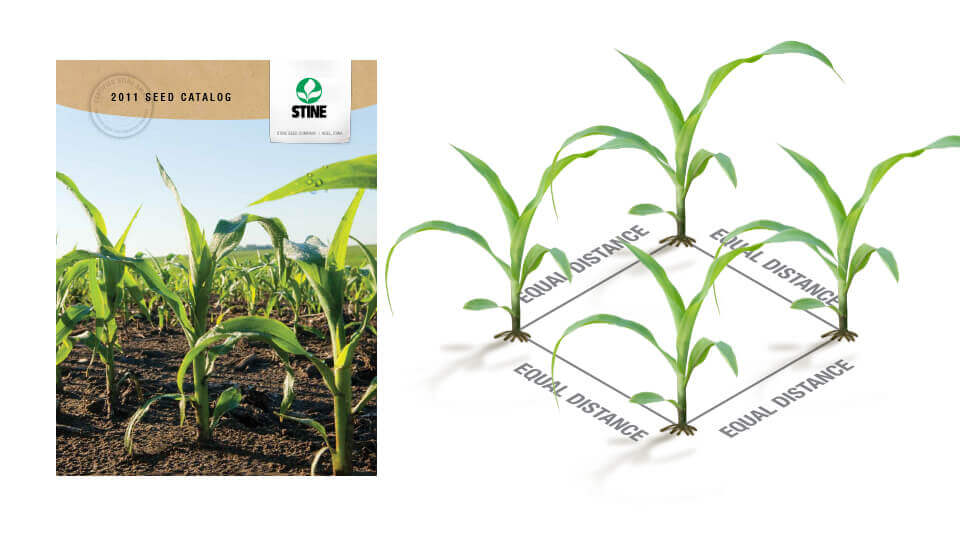

2013
Stine’s high population corn system evolves again, as the company adopts its new HP Twin 20 production system. This planting method combines the best of both worlds, allowing growers to achieve the benefits of planting in ultra-narrow rows while still allowing the crop to be harvested with a standard 20-inch corn head.
Stine achieves another industry first, becoming the first entity to receive non-regulated status for a cisgenic trait. Event HCEM485, which utilizes naturally occurring corn genes to confer glyphosate tolerance in corn without the use of foreign DNA, is deregulated by USDA, making it the first trait of its kind to be deregulated by USDA.
Harry Stine is named a Top CEO in STEM (Science, Technology, Engineering and Math) by STEMConnector.
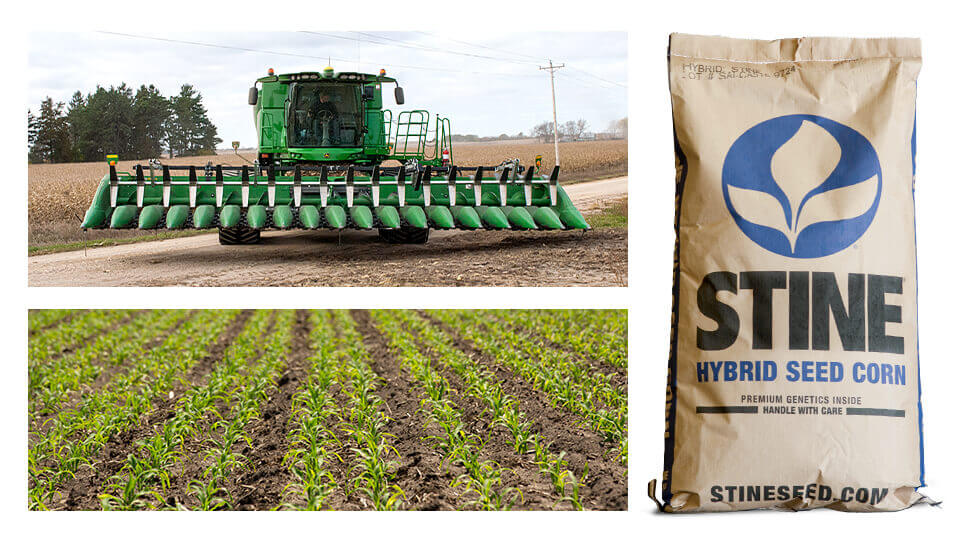

2014
Proving that the HP corn® movement is about more than just seed, Stine announces a first-of-its-kind initiative aimed at helping growers adopt the new HP Twin 20 planting system. Select growers are able use a Twin 20 planter on their farm to see for themselves the benefits. Growers then have the option to purchase a planter for their own farm.
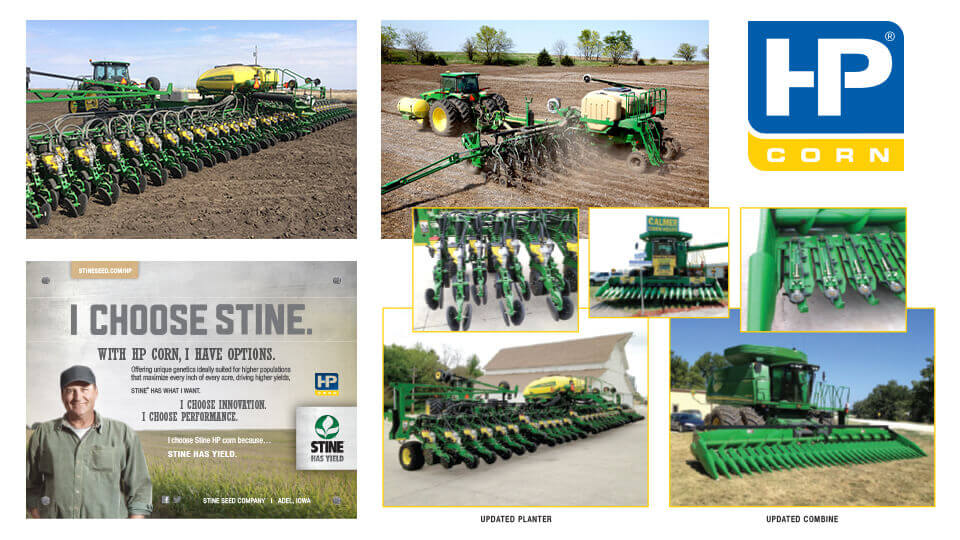

2018–2019
Stine is the first company to introduce a new line of soybeans in 2018 — LibertyLink® GT27®. An additional tool to help growers tackle tough weeds, Stine LibertyLink GT27 soybeans were the first commercially available triple-stacked herbicide trait option, featuring built-in tolerance to Liberty®, glyphosate and certain HPPD/Group 27 herbicides.
In 2019, Stine launches the industry’s most expansive lineup of Stine Enlist E3® soybeans, offering growers multiple maturities to fit key growing environments across the Midwest and beyond. In anticipation of this new product introduction, Stine was one of the only companies ready with a significant supply of Enlist E3 soybeans available for planting in 2019. Upon launch, Stine was able to offer 37 Enlist E3 soybean options in its inaugural year and ended up selling a quarter million units, all sold after the mid-February launch.
Also in 2019, Stine brand celebrates its 40th year in business.
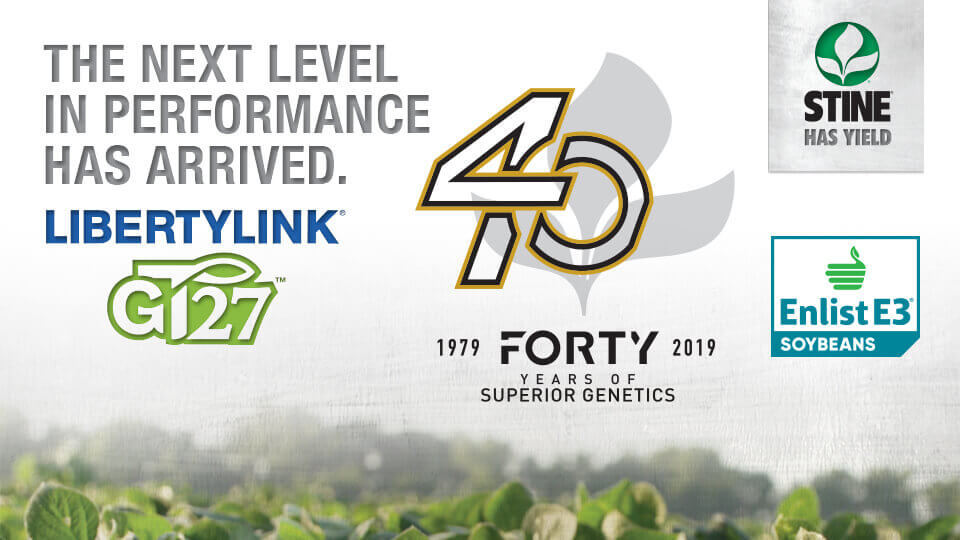

2020–2023
In 2020, Stine becomes the 4th largest soybean brand in the United States.
Many of “The Big Four” seed companies begin signing on to the short-corn revolution, developing and testing their own material — more than a decade after Stine. Stine continues to hold firm that we invented short-stature corn. Then, we perfected it.
In 2021, Stine introduces MX Series Corn to the marketplace. These one-of-a-kind hybrids are developed from the most superior corn genetics and feature season-long performance and premium seed protection for fast starts and outstanding early-season growth.
Also in 2021, Stine launches the Stine Seedcast — the first-ever podcast dedicated to all things Stine.
In 2023, Stine expands its retail brand into Canada, offering high-yielding soybean seed to growers in Ontario. The company also grows its front-line sales team, which exceeds 300 sales reps in the United States.
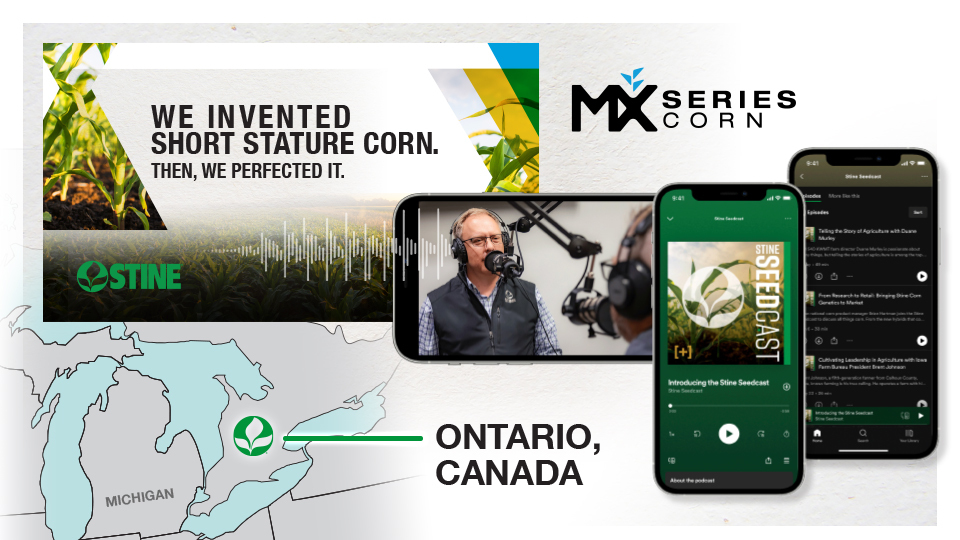

Stine Seed Today
Stine and its affiliated companies own more than 800 seed and technology-related patents, at least 750 of which are directly related to soybeans. Stine’s network of employees and sales agents has grown to nearly 800 people in 30 states and Stine is one of the largest privately owned seed companies and the fourth largest soybean seed brand overall in the United States. Stine remains the industry leader in offering the broadest lineup of Enlist E3 soybeans and the most advanced high density/short corn genetics — multiple generations ahead of the competition. Stine continues to expand its global reach, participating in the United States, Latin America and the European markets.
